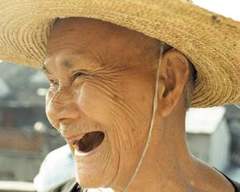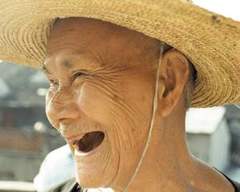
Is the goal of life to be happy? by Wendy Bramham
Why is it so hard to be happy?
I have been giving much thought to this question lately. Is the goal of life to be happy, or is there a better way of looking at things? What affects our ability to find lasting happiness, and how can we each find meaning for our lives?
Does society have a part to play?
In the 1980s I travelled extensively in South-East Asia and was able to mingl e with locals as if I was one of them. I met people who were poor and yet seemed strikingly content and happy in ways I hadn’t seen in the West. Their work and community were local, and this gave them a sense of belonging, inherited traditions and support; and they were relatively untouched by media networks, and consumerism. Conversely, the West, with its numerous distractions and overwhelming information, constantly bombards us with the idea that the next great job, cosmetic, romance or holiday will make us feel worthy, attractive, successful, and, finally, happy. And we’re not!
e with locals as if I was one of them. I met people who were poor and yet seemed strikingly content and happy in ways I hadn’t seen in the West. Their work and community were local, and this gave them a sense of belonging, inherited traditions and support; and they were relatively untouched by media networks, and consumerism. Conversely, the West, with its numerous distractions and overwhelming information, constantly bombards us with the idea that the next great job, cosmetic, romance or holiday will make us feel worthy, attractive, successful, and, finally, happy. And we’re not!
What’s the alternative?
Unlike so-called ‘primitive’ societies, modernity favours doing rather than being; activity not stillness; individualism before community; reason more than emotion; instant gratification over waiting, and, now, virtual connections over face-to-face contact. We are embedded in the physical world in which everything changes and we have to grab on to whatever security we can find before it is lost or dies. I believe that part of the human condition is to experience (consciously or unconsciously) a sense of inner “lack”, and the more our self-esteem is fragile, the more we will be prone to compulsive striving for something outside of ourselves. Therefore, we miss a connection with a ‘second reality’ which is the inter-connectivity of all life. Some would call this: soul, nature, tao or universal energy, and it is constant, limitless and undying. Carl Jung, the founder of analytical psychology, called it the “collective unconscious”. The holistic health and spiritual educator, William Bloom, defines this missing link as “connection with the wonder and energy of all life”(1). And it is through this deeper connection with ourselves, others, our activities and life in general – that I believe ‘happiness’ can be found.
But how?
Our physical lives, and our connection with a second, non-physical reality, are both important. However, if we are only in the physical it is difficult to experience contentment because we know that loss or death will take away what we have in the end. But if we can also connect with our deepest core – the soul, if you like, or the authentic Self – that is already complete and which exists at a non-material level, then we might begin to access greater meaning, purpose and fulfillment. Personally I do this through simple things such as being in nature, sunshine, solitude and dancing. For others it might be through music, art, human intimacy, gardening, yoga or mindfulness practice or being with animals.
Log off!
I was at a spa recently where, at the entrance, a sign read: “time to switch off your phone and come to your senses”. Logging off is a simple method for opening up the possibility of accessing the ‘second reality’ but is a lot easier to say than do. The digital world keeps us switched on, drawing us out of our inner experience, and supplying false comparisons with others’ seemingly glossy lives on facebook or instagram. It’s hard to slow down and experience our inner selves because that is where we might encounter our past pain and true feelings.
Therapy helps
Therapy can help to understand and resolve past or present traumas, losses and unconscious patterns that undermine our sense of “self” and authenticity. Many of us also need help with living in the second reality and accessing a deeper level of happiness, meaning and contentment than we have previously known. For many people therapy provides a space in which to work through the questions like ‘what do I really want?’ and ‘what will give my life meaning?’, and to find our own personal keys for transcending the everyday and connecting with the ‘wonder and energy of all life’.
Summary
There is not a great deal we can do about the culture in which we live. However, we can slow down enough to reflect on our personal values, meaning, purpose and integrity, which in turn can help us resist society’s pressures. Striving or grasping seems to drive happiness away from us. We need to understand that “happiness” is almost always transient; like the waves of life’s inevitable gains and losses. But while life is tossing us around on the surface of the ocean maybe we can connect with the bedrock beneath the waves, where stillness, peace of mind and authenticity can be found. I believe that here we can access personal values, meaning and purpose; and have a better chance of experiencing moments of joy and happiness.
Author: Wendy Bramham MBACP (Snr Accred)
Editor: Briony Martin MBACP
December 2015
This blog is an abbreviated version of a longer article Wendy hopes to publish in a professional journal.
References
1. Bloom, W., 2011, The Power of modern spirituality, Piatkus, p. 6
Further reading
HH Dalai Lama & Cutler, H.C., 1998, The Art of Happiness, Coronet Books
Epstein, M., 2001, Going on Being, Broadway Books
Fordham, F., 1991, An Introduction to Jung’s Psychology, Penguin Psychology
Hollis, J., 1998, The Eden Project, in Search of the Magical Other, Inner City Books
James, O., 2007, Affluenza, Vermilion
Somers, B. & Brown, G., 2002, Journey in Depth, Archive Publishing
Tolle, E., 1999, The Power of now, Hodder & Stoughton
Williamson, M., 1992, A Return to Love, Thorsons
Yalom, I. D., 1989, Love’s Executioner and other tales of Psychotherapy, Penguin Books
If you are considering therapy please read more here




This Post Has 0 Comments